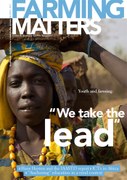Editorial: Agriculture is sustainable if it can attract future generations of young farmers. But the overwhelming tendency of young people is to move out of farming, in search of a more comfortable life and better income.
Does it mean that within the next few decades farming as a livelihood will cease to exist, and that all agricultural activity will be concentrated in highly mechanised, large scale entreprises, with as little human labour involved as possible? How sustainable is that option?
One of the things lacking in today’s agriculture is imagination. Today’s generation of farmers, teachers, agricultural scientists, policymakers and also the media have collectively failed to trigger the imagination of young generations. “Yes, there are major challenges, farming is not an easy or glamourous option, BUT there are ways of doing agriculture in a sustainable and rewarding manner”. This could have been their message, but who has been able to give it hands and feet? We heard only a few concrete positive examples from you, dear readers!
Yet, in this issue of Farming Matters we see glimpses of hope. Recently I landed up in the “heartland of the Indonesian Green Revolution”. I met a lively group of junior high school students participating in a four months intensive course on organic paddy cultivation. They shared their hopes for a better agriculture. “But”, they told me, “we need magazines like Farming Matters that can show us how to make our hopes a reality. Our parents have lost touch with agriculture and therefore we need to re-learn what they forgot, and connect with other sources of knowledge.”
In a similar vein, a Kenyan teacher told me about the Maarifa centre he had set up in his native village. This centre, which houses a few computers and has internet connectivity, is making all the difference for the local youth. They now easily connect with a much larger world of knowledge on agriculture. It helps them to re-value agriculture and discover new ways of making agriculture profitable and sustainable. The teacher himself confided that his decision to return from Nairobi to his native village was one of the best things he did in his life.
Text: Edith van Walsum, director ILEIA

